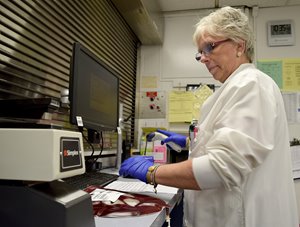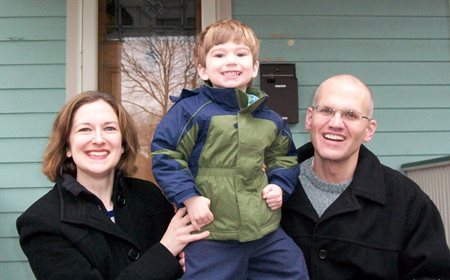Gene Study Points Researchers to New Pathway for Leukemia
Leukemia is one of the hardest cancers to treat, but scientists have discovered a new, targetable pathway in one of the worst subtypes of the disease.
The study, although only relevant in mice and human cell cultures at this point, is important because researchers found that an existing drug, known as creatine kinases inhibitor, is effective at attacking acute myeloid leukemia (AML) in the laboratory.
University of Rochester Medical Center and Wilmot Cancer Institute scientists Archibald Perkins, M.D., Ph.D., and Yi “Stanley” Zhang, Ph.D., teamed up with researchers at Harvard University and the Massachusetts Institute of Technology to study a particular gene, EVI1. When this gene is active, certain types of leukemia and some solid tumors, such as ovarian cancer and some breast cancers, are virtually untreatable.
Their study recently was published in the high-impact journal Nature Medicine. The group showed that when EVI1 is abundant in leukemia, it changes the metabolism of immature blood cells as they progress toward becoming cancer—but also leaves EVI1-positive cancers vulnerable to treatments that can strike down that pathway.
The Perkins/Zhang laboratory in the Department of Pathology and Laboratory Medicine has been investigating the EVI1 gene for several years, resulting in a solid track record of publications on the topic. Their goal is to discover new treatments that will target the underlying pathways involved in EVI1-positive cancers. The Perkins/Zhang data supported Harvard’s and MIT’s investigation of what drives the EVI1 gene.
Leukemia is a type of blood cancer in which abnormal blood cells crowd out the healthy white blood cells responsible for fighting infection. More than 10 different major subgroups of leukemia exist. Many types of leukemia are resistant to treatment, although some patients with AML and other blood cancers can achieve long-term remission if they qualify for a stem cell transplant. Wilmot’s Blood and Marrow Transplant Program is the only program in the Finger Lakes region to offer that therapy.
The Nature study was recently highlighted by the American Association of Cancer Research. Perkins and Zhang are working on other leukemia studies as well, supported in part by Wilmot seed funds and by the URMC Clinical & Translational Science Institute.
Leslie Orr | 5/8/2017




